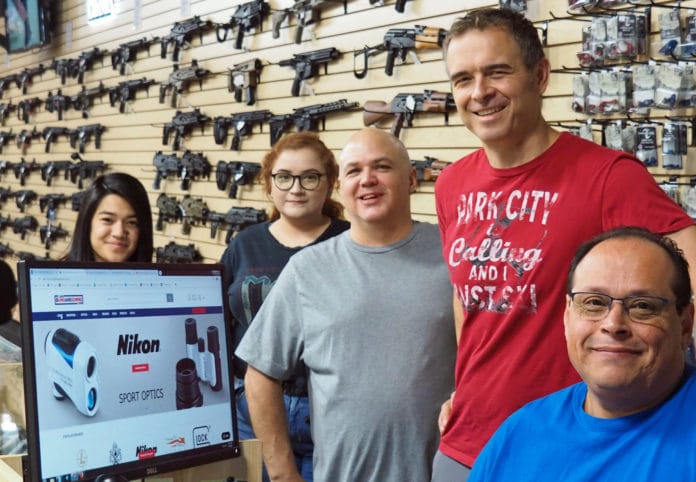Give Russian-born and raised Weby Corp CEO Mikhail Orlov credit: He’s caught on to U.S.-style entrepreneurial capitalism with a multi-million-dollar flair.
So much so that the 10-year-old North Richland Hills e-commerce company (it moved its headquarters from Arlington this month) recently bumped into Inc. Magazine’s top 5,000 fastest growing U.S. companies, coming in ranked 2,076th. SMU’s Cox School of Business ranked it as the 30th fastest growing company in this Metroplex.
This is a big, affluent country, so what does it take in sales to rank that high?
“About $49 million last year,” says Orlov, 42. “We’d like to jack it up another $10 million this year but with a little better return.”
Weby Corp has a couple of conventional retail stores – a gun store in North Richland Hills, a running shoe store in Mansfield – but 95 percent of its revenues come from internet sales via about 500 product lines.
Mostly it tends to be sporting-oriented gear with hunting or sport shooting emphasis, the top providers being Leopold, Nikon, Citka Gear, Vortex Optics and Crimson Trace.
Weby Corp also has another entrepreneurial oddity.
Orlov’s two partners and co-founders, company president Igor Mortkin and CIO Alex Grigorenko, are Belarusians – both Minsk natives.
The on-line internet side of things runs out of Belarus, a considerably less costly way to provide e-commerce marketing services. Belarus is a Nebraska-size, landlocked county bordered by Russia, Latvia, Lithuania, Poland and Ukraine. About half of Weby Corp’s approximately 100 employees are in this country, the other half in Belarus.
Orlov himself grew up in Moscow, where his mother was math teacher, his father a rocket scientist, or technically an engineer specializing in rocket and satellite technology.
While in Moscow, Orlov fraternized with some U.S. exchange students.
“We all liked heavy metal bands like Metallica and I found the students to be absolutely fascinating,” he recalls – so much so he ended up applying for and receiving a scholarship to Westminster College in Missouri.
“I’d studied English in high school in Moscow but discovered that it was not the same English they spoke in Missouri, so it was a little difficult initially,” Orlov said with a laugh.
His English today, however, is virtually accent free. For this, he credits his brief 18-month career after college as a car salesman.
“I had a degree in political science and international studies but found very little demand for those skills in Missouri,” Orlov said. “One of my classmates told me that DFW was a hot spot full of jobs. I landed one, selling new Fords, which is a good way to pick up language skills but also a virtual compression of American commerce – manufacturing, supply, demand, buy low, sell high, trade, swap, finance, repair, negotiate, insure, meet every kind of person, establish rapport, all of it.”
Along the way he also became a U.S. citizen. And a fervent capitalist.
Orlov’s transition to the world of e-commerce began in a Dallas Army-Navy surplus store right before he planned to return to Russia for a visit. He asked the proprietor if he had any used Russian military equipment.
“He said he didn’t, but that if he did, he could sell it,” Orlov recalls. “As you can imagine, there were people in Russia with lots of old military gear to sell.”
Orlov from his Russian trip found plenty of suppliers for such gear – including used Russian small arms firearms – but ran into a critical snag.
His Army-Navy store proprietor and others of his ilk wanted to pay such low prices for the gear that it would be impossible to make money.
“The option was to skip the middleman and sell it on-line, which I did with a partner,” Orlov said.
That partnership eventually ended, but by then Orlov had refined his idea of not only bypassing the middlemen but also many other e-commerce companies that were also, in effect, the equivalent of middlemen (Weby does, however, still market on Amazon).
Since its creation in 2010, Weby Corp has been steadily growing, albeit with a refinement or two.
“Originally we had two major components – one in on-line retail and the other in computer programming services,” he said. “It soon became obvious that the money was in retail and our focus shifted to that.”
Weby quickly outgrew its original headquarters in Mansfield, shifting to a store and larger warehouse in Arlington.
It eventually outgrew that space as well, and earlier this year purchased Total Shooting Sports facility, a 94,218-square-foot indoor gun range and retail operation located on Texas 26 near Loop 820 in North Richland Hills. The facility was originally a Home Depot design center. The move there was completed this month.
“We’re going to bring the building to life in a unique way, since it’s big enough for an expanded gun and hunting store – maybe 12,000 square feet for that – plus our warehousing and corporate offices,” he said. “We’ll probably also re-open the gun range, since it seems complimentary to the gun store.”
And after that?
Orlov said that while Weby Corp will always be primarily an on-line business, the company is also a believer in the in-store retail experience and – after adjusting and refining its new corporate headquarters – will be looking to add more conventional stores.
O.K. Carter is a former editor and publisher of the Arlington Citizen-Journal and was also Arlington publisher and columnist for the Star-Telegram and founding editor of Arlington Today Magazine. He’s the author of the definitive book on Arlington’s colorful history, Caddos, Cotton and Cowboys: Essays on Arlington.
okcarter@bizpress.net






